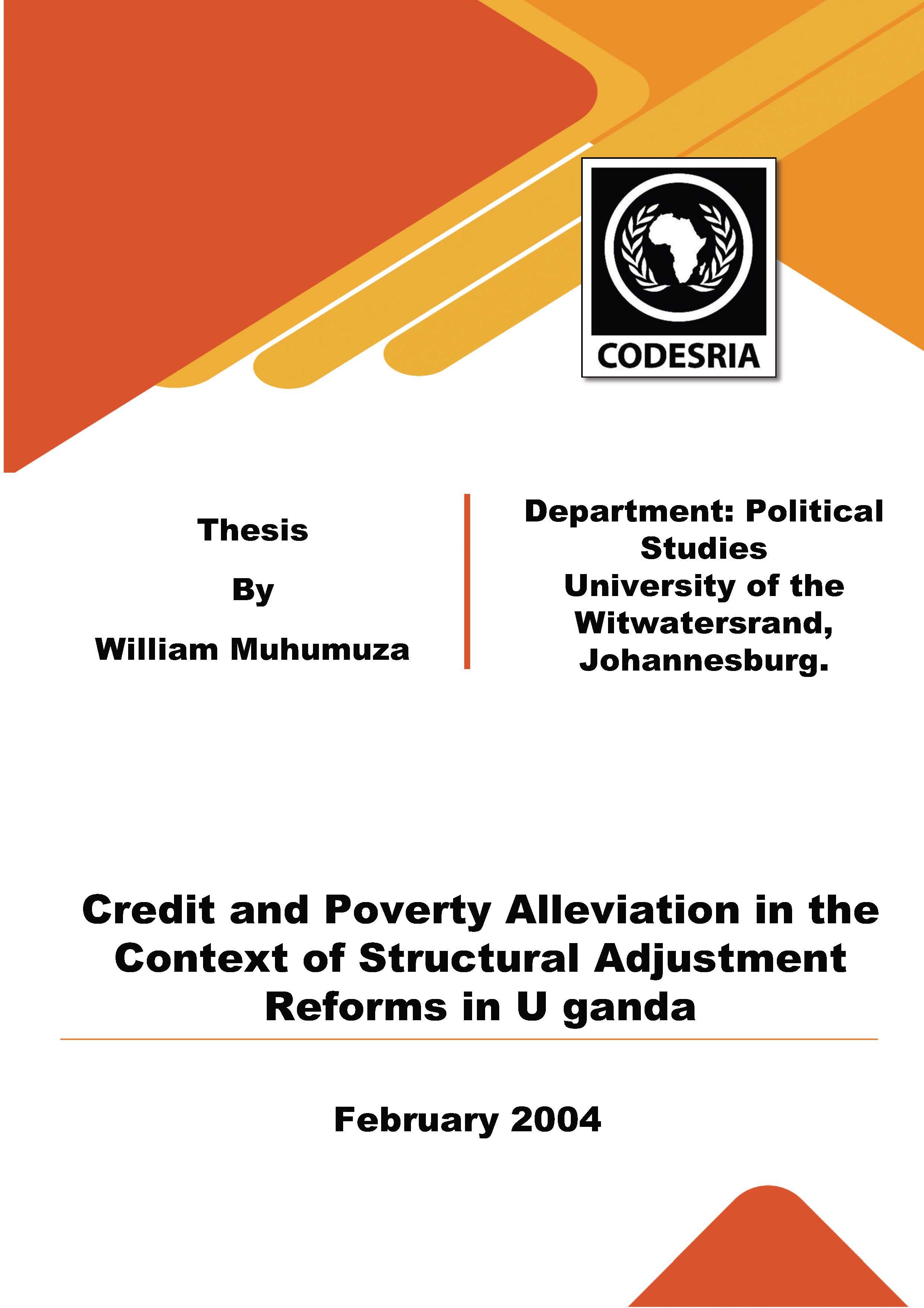Credit and Poverty Alleviation in the Context of Structural Adjustment Reforms in Uganda
Mots-clés :
Credit, Poverty Alleviation, Structural Adjustment Reforms, UgandaSynopsis
The thesis focuses on ,credit as one of the policy strategies that have been pursued by the National Resistance Movement (NRM) government to combat poverty. It examines the· magnitude of the economic crisis inherited by the NRM gover:nment when it came to power in 1986. It also explores the nature and effects of econornic reforms that were pursued to reverse the negative economic trend. The thesis argues that while the implementation of stabilisation and adjustment reforms initially had adverse effects on the vulnerable groups, it has in the long run reduced poverty although some policy challenges remain.
The thesis then critically assesses the extent to which credit can alleviatepoverty. In a bid to test the theoretical argument that grassroots approaches are superior to those imposed from higher institutions, the study assesses in a comparative perspective, the extent to which credit interventions by gover:nment, Non-gover:nmental Organisations (NGOs) and Commu:nity-based Organisations (CBOs) have been effective in alleviating rural poverty .
The assessment of credit interventions by the three agencies as a strategy towards poverty alleviation was conducted in the two districts of Uganda namely, Mbarara and Mpigi. The study used an ethnographie research design to capture the fundamental aspects of credit agencies as well as their impact on the welfare of the beneficiaries. The data gathering methods involved the cross-fertilisation of quantitative and qualitative techniques (triangulation). Secondary data sources like govermnent documents, the press, serninars, and the library supplemented this information. The accruing data was subsequently organised, edited and carefully interpreted using simple statistical techniques ( descriptive statistics) and content analysis.
The findi.ngs of the study established that credit generally gives a temporary relief to the poor in the short-run but is not a panacea to poverty alleviation unless supplemented with other remedies. It was further found out that though grassroots credit initiatives had a positive and general impact, they were insufficient to combat poverty. Similarly, credit given by NGOs was found to be patronising, inadequate and characterised by rigid terms and conditions to enable the poor to breakeven. Conversely, the state-directed credit, which had better terms and involved big amou.nts, had registered poor performance because of political interference and mismanagement.
The theoretical implications of these empirical findings therefore disagree with the otherwise heralded view that grassroots approaches to poverty alleviation are superior to those imposed from higher institutions. The findings of this study instead demonstrate that the two approaches need to supplement each other if they are to have a positive and ever lasting impact on the lives of the poor. The study shows that in a backward economy where the factors of production are underdeveloped and the private sector is embryonic, state intervention (although it does not necessarily have to be direct) is necessary. This thesis however proposes that such top-down interventions be chaimelled through grassroots institutions if they are to be effective.
The study concludes that for credit to be an affective intervention against poverty, it must be supplemented by other policy initiatives such as prudent macroeconomic management, infrastructure development, efficient markets, good governance and effective services. The thesis insists that for these essential ingredients to be effectively availed require a partnership between the different agencies such as the private sector, NGOs, government and grassroots self-help organisations. Such a situation therefore justifies the need for adopting a state-society synergy approach to poverty alleviation, which has been adopted for this study.
Téléchargements
Références
Ablo, E. and R. Reinikka, The World Bank, Do Budgets Really Matter? Evidence from Public Spending on Education and Health in Uganda, Kampala, Uganda, October 26-28, 1999.
Adams, D. W., Graham, D. H. and J. D. Von Pischke (eds.) (1984), Undermining Rural Development with Cheap Credit, Boulder, Co.: West View Press.
Alcock, P. (1997), Understanding Poverty, London: Macmillan Press Ltd.
Appleton, S. (2001), 'Changes in Poverty and Inequality,' in Ritva Reinikka and Paul Collier (eds.), Uganda's Recovery: The Raie of Farms, Firms and Govemment, Kampala: Fountain Publishers, pp. 83-121 .
Ascroft, J. and Sipho Masilela (1994), 'Participatory Decision-Making in the World Development,' in Shirley A. White, K. Sadanadan Nair andJoseph Ascroft (eds.), Participa/on; Communication: Working for Change andDeveJopment, New Delhi and London: Sage Publications, pp. 259-94.
Bamunoba, Y. K. (1964), 'Notes: Blood Brotherhood in Ankole,' The Uganda Jaumal, 28 (2) (September): 217-8.
Bastelaer, T. V. (2000), 'Does Social Capital Facilita te the Poor' s Access to Credit? A Review of the Macroeconomic Literature,' Social Capital Initiative Working paper No. 8, Washington, D. C.: World Bank.






